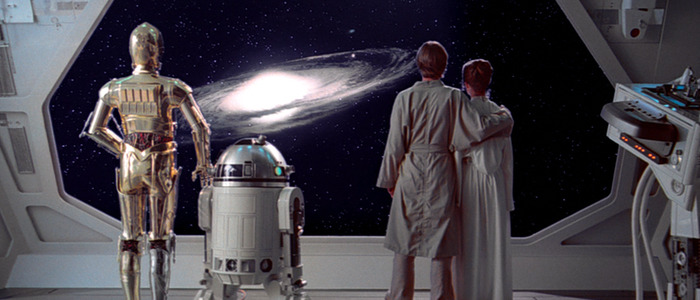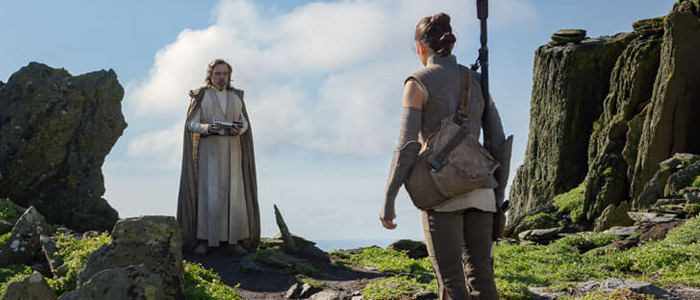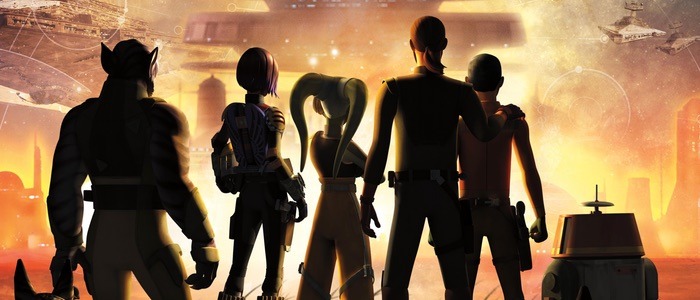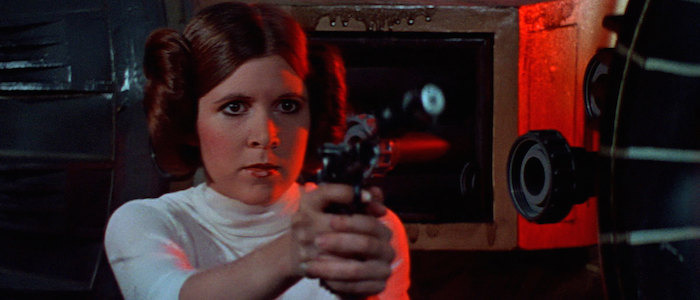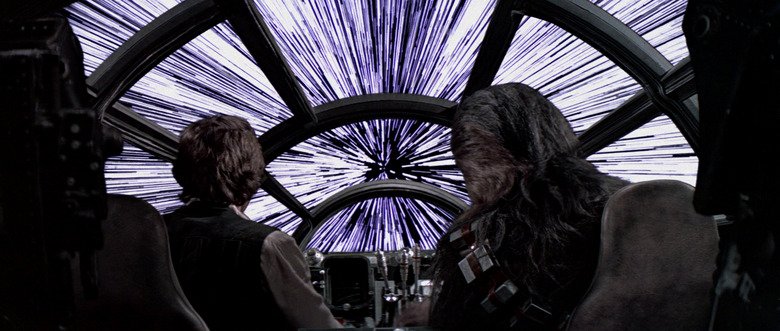Yes, 'Star Wars' Is For Kids – And That's Why It's Great
Last month, Blade Runner 2049 director Denis Villeneuve caused quite a stir in the Star Wars community. Talking with FANDOM about his upcoming film adaptation of Frank Herbert's sci-fi epic Dune, Villeneuve described his vision for the project: "The ambition is to do the Star Wars movie I never saw," he said. "In a way, it's Star Wars for adults." Naturally, this offhand comment sent fans into an uproar. With the phrase "Star Wars for adults," Villeneuve is very clearly asserting that Star Wars itself is "for kids."
To which I reply: You're damn right Star Wars is for kids! And that's precisely what makes it so beloved and so culturally resonant.
Dune vs. Star Wars
But first, a caveat: I don't think Villeneuve really meant to disparage Star Wars, per se – he points out in the very same interview that Dune and Star Wars share a similar mythology and similar details, so his concern about separating his adaptation of Dune from the more conventionally known sci-fi universe of Star Wars seems to be mainly fueled by a creative desire to produce something artistically distinct.For my own part, I'm fine with the distinction: I, erm, completely loathed Dune. It was the book that turned me off from sci-fi books for years after I finally, finally turned the last page of that first installment and breathed a sigh of relief. Sure, Dune is one of the bestselling science fiction novels of all time, but I found it to be as dry as the sands of – excuse me while I look up the name of the desert planet that is not Tatooine or Jakku – Arrakis.I don't mean to disparage fans of the Dune saga, since it's obviously appreciated by many, but for me, it lacked heart. Star Wars, as much as it also traffics in intergalactic spice trades and political upheavals and violent uprisings, is not really about all that. It's about finding friendship in unlikely places, having courage in the face of unspeakable odds, and standing up for one's beliefs. And yes, it's about escaping to a world where the bad guys are literally dressed head-to-toe in black, where robots are our buddies, and where Ewoks, Porgs, and even Gungans stretch the whimsical limits of our imaginations.
But what about escapism?
As children's author Madeleine L'Engle once said: "You have to write the book that wants to be written. And if the book will be too difficult for grown-ups, then you write it for children." Or in Yoda's words, after a mere youngling helps Jedi Master Obi-Wan Kenobi locate a missing planet: "Truly wonderful the mind of a child is." Sometimes, a simplified – but unexpectedly wise – child's-eye view of the universe is precisely what we need.Children's stories that are consumed by adults are often dismissed as works of "escapism." This term is tossed around as a tried and true insult and is applied to something that ostensibly has no real value or worth. Escapist fiction, like all kinds of children's entertainment (which included, until recent decades, comic books), is considered a drug-like substitute for stories that more directly reflect the world we live in. Escapism is looked upon as a detriment to the human experience, distracting us from "the real world" in order to light up the brain's reward circuits with empty pleasures.But escapism gets a bad rap. I don't know if you've noticed, but "the real world" can be pretty terrible – so, at worst, escapist fantasy brings people some much-needed happiness for a bit. But like all works of fiction, escapist fiction also does so much more. As Neil Gaiman explains in his collection of essays, The View From the Cheap Seats:
"If you were trapped in an impossible situation, in an unpleasant place, with people who meant you ill, and someone offered you a temporary escape, why wouldn't you take it? And escapist fiction is just that: fiction that opens a door, shows the sunlight outside, gives you a place to go where you are in control, are with people you want to be with (and books are real places, make no mistake about that); and more importantly, during your escape, books can also give you knowledge about the world and your predicament, give you weapons, give you armour: real things you can take back into your prison. Skills and knowledge and tools you can use to escape for real.
As J.R.R. Tolkien reminded us, the only people who inveigh against escape are jailers."Like the term "guilty pleasure," the concept of "escapism" is a fallacy. The stories we spend time with do have inherent value. Whether you're gaining strength from a fearless, Huttslaying princess, learning forgiveness from a newly minted Jedi Knight, or simply cuddling with a life-sized Porg plushie, the joy you get from Star Wars is real – "escapist" or not.
Star Wars as a moral fantasy
George Lucas has made it pretty clear that Star Wars was geared towards children from the beginning. Let's review the story: Farm kid wants to join space college like all his cool friends. But his aunt and uncle make him do chores! Kid meets crazy old wizard who confirms he's meant for something more. Aunt and uncle die, kid is sad but realizes he can now fulfill his destiny. Kid teams up with a sidekick who needs to learn to be less selfish. They rescue a princess who doesn't need much rescuing, since she's a smart and capable young woman and not a damsel in distress. They join a group of rebels who are fighting against an evil empire. Kid uses his special power to destroy the big, scary superweapon. Etcetera.I won't go through every film, but you get the idea: Star Wars plays around in the sandbox of mythical narratives (most famously, the Hero's Journey) that are universally recognizable and appealing to all ages. The Star Wars stories are very, very different from, say, a movie about slavery in the American South or a television show about a cancer-stricken, meth-cooking chemistry teacher. Star Wars is unabashedly moralistic, teaching us that evil must be fought, that the vulnerable must be defended, that love is stronger than hate – and it presents these ideals without irony or grey-scaled caveats. "Adult" fiction often unflinchingly describes the way the world is, but children's stories describe the way the world should be.The most widely esteemed Star Wars content currently airs on Disney XD, a channel geared towards kids between the ages of 6 and 14. Star Wars Rebels – like The Clone Wars before it – is an animated children's show which presents tidy moral lessons (in the case of Clone Wars, these mantras are literally spelled out on-screen) in 22-minute increments. I can't speak for the 6 – 14 demographic, since I don't have many friends in that age range. But I know plenty of Star Wars fans above the age of 25 (myself included) who absolutely adore Rebels. Whether we watch it despite the fact that it's written for children or because of it, we still know exactly what we're in for – and it ain't The Punisher.For example, November's mid-season finale ended with Ghost captain Hera Syndulla taken into custody by the Empire. Adult viewers know she's going to be fine, and it's not just because she has already cropped up unharmed in chronologically later stories. We know Hera is going to make it out of this quandary because Star Wars Rebels is a kids' show, and if you're looking forward to witnessing the Empire yank out a character's fingernails as a method of torture, you're probably on the wrong channel. And in the wrong saga.We're not watching Rebels in order to be exposed to brutal coercion tactics enacted by dictatorial regimes. The setting is merely a springboard for exploring themes of found families (the Ghost crew, the original trilogy trio), dedication to a cause larger than oneself ("Godspeed, Rebels!"), and the importance of hope in dark times. These notions may seem cheesy when held up next to the harsh realities of our world, but that's why we need children's stories – especially fantasy stories – to remind us of the ideals long forgotten by jaded adults.Star Wars definitely embodies a more simplistic morality. Children will have their whole lives to figure out where they stand on corporate tax cuts, subsidized housing projects, and sexual liberation, but their moral consciences must first be shaped from nothing, and they can learn to exercise this burgeoning moral conscience in a safe and simpler space – in a galaxy far, far away.Going back to basics can be important for adults, too, as we are confronted with moral lessons we have lost sight of while wading in the weeds of IRL politics. When old Ben Kenobi is confronted by his old nemesis Maul in the Rebels episode "Twin Suns," their final battle is unexpectedly short, and it culminates with Ben cradling Maul's dying body and treating him with surprisingly tender respect. "Twin Suns" is not supposed to be a practical guide to the intergalactic criminal justice system; rather, it presents a larger – and smaller – lesson about the virtue of forgiveness, and the crippling bitterness caused by constant hatred and spite.
Smells like teen spirit
Since the law of entropy dictates that everything on the internet must eventually devolve into an Episode 8 slugfest, how does all this relate to The Last Jedi? There is a pervasive belief that a movie or television show must be gritty and edgy to be important, that The Force Awakens is a lesser film because it gives fans exactly what we desire, and that The Last Jedi is a superior film because it blows everything up, tears everything down, and scoffs at sentimentality. But in the words of David Foster Wallace, this "hip, cynical transcendence of sentiment" is, in a visceral way, a denial of what it means to be "really human."What I love about Star Wars is that it is not cynical, even its darkest storytelling hours. Acclaimed YA fiction author John Green makes note of this in an Atlantic article about why so many adults love literature featuring teens. "Teenagers have a reputation for being jaded and cynical," he says, "but in fact I find them wondrously lacking in cynicism and wondrously earnest in their un-ironized emotional experience."This "un-ironized emotional experience" is why I love Star Wars, and why I was uncomfortable with the critical self-reflection of The Last Jedi. Perhaps this is why Star Wars in general resonates with all ages – and why some of the best Star Wars stories are aimed at younger audiences. Claudia Gray's novel Lost Stars, which charts the diverging journeys of a burgeoning Rebel and a devoted Imperial, is widely believed to be one of (if not the) best work of fiction in the new canon universe, even though it's a YA book – and a love story to boot!When I asked Gray why she thought the novel resonates even with older audiences, she suggested:
"The one true difference between YA novels and adult ones is that YA novels feature teen protagonists and are centered on coming-of-age experiences. Adults still respond to a lot of these books because they were teens too, once! Those coming-of-age experiences are more universal than many adult experiences are. (Which is no doubt one reason why so many Star Wars movies are themselves young adult narratives.)"
Indeed, Star Wars Rebels follows the growth of teenage protagonists Ezra Bridger and Sabine Wren, while Luke and Leia are meant to be 19 at the time of A New Hope. And let us not forget The Phantom Menace, which stars a (supposedly) 14-year-old Padmé Amidala, a (slightly more believable) 25-year-old Obi-Wan Kenobi, and a (maybe too believable) 9-year-old Anakin Skywalker.Gray points out that YA experiences tend to be more universally appreciated than adult ones, since, obviously, adults have already gone through their own coming-of-age experiences, while children have yet to experience adulthood. But adults also recognize that "growing up" is actually a fantasy – we're always growing and changing, even as adults. Perhaps there's a bit of regret-tinged nostalgia involved, too: if only we had grown up better, if only we had overcome our struggles in that tied-up-in-a-bow, storybook way, if only we had laser swords and the Force and a giant, huggable bear-dog for a best friend.
How to slay a (Krayt) Dragon
Or maybe: If only we hadn't grown up at all. Perhaps we are all caught in the thrall of the Peter Pan syndrome, desperately grasping at the remains of our childhoods as a method of avoiding confronting adult responsibilities. This is the dangerous side-effect that people visualize when they disparage "escapism," but it is only one aspect of the Star Wars-as-children's-story appeal.Sure, many OG fans remember being blown away by the first Star Wars film at a tender young age, and they are surely thrilled by the prospect of recapturing the magic of their youth with the new movies, books, and shows. But these fans also now have the opportunity to introduce the saga to their own children through content that is unequivocally geared towards even younger audiences, such as the female-centric "Forces of Destiny" shorts on YouTube and the Star Wars Adventures comics from IDW. And even those stories deliver a ghost of a wink to older audiences – especially older female audiences, who can sleep well at night knowing that we finally live in a world in which little girls will never be in any doubt that Star Wars is for them, too.In the (turbulent) wake of the release of 1999's The Phantom Menace, George Lucas came to the defense of the film's "childlike" tone: "There is a group of fans for the films that [...] want the films to be tough like Terminator, and they get very upset and opinionated about anything that has anything to do with being childlike," he said. "The movies are for children but they don't want to admit that." (In the same article, Lucas also firmly rebuffs the notion that the character of Jar Jar Binks is a racist stereotype, which... is a conversation for another time, meesa thinks.)But I believe there's an important difference between childlike – the term Lucas uses, and a word that connotes wonder – and childish, a word that calls to mind rash immaturity. Star Wars, as a type of retro-futuristic fairy tale, is certainly childlike, and that's what makes it so beloved and so long-lasting: We can (re)learn important life lessons while looking through the "truly wonderful" mind of a child. As G.K. Chesterton said: "Fairy tales do not tell children the dragons exist. Children already know that dragons exist. Fairy tales tell children the dragons can be killed." And sometimes, we grown-ups need a reminder, too.

